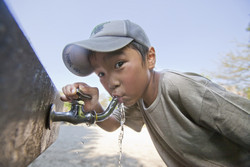Smart sensors monitor water supply and harvest energy
The goal of the SMARTWATER (Smart sensor networks with energy harvesting for real time monitoring in urban water infrastructure) project was to improve the intelligent monitoring of water infrastructure. This was achieved by investigating smart sensor networks with energy harvesting for real-time monitoring. The consortium comprised six research institutes from China, the Netherlands and the United Kingdom that are experienced in smart sensor networks and communication. The six organisations were also leaders in power harvesting technology, intelligent monitoring, real-time modelling and control in the water distribution system. Researchers addressed the challenge of limited power resources for the monitoring of the water distribution system by examining the sensor network and identifying intelligent power management systems for improving energy consumption. The results can be applied commercially to build a self-powered data logger for use by water utility companies. Benefits to end users of the research results included reduced dependency on battery power, as well as reduced installation and monitoring costs. Other benefits involved lower water consumption, the detection of abnormalities in the water supply system and energy saving. The consortium trained researchers in the area of energy harvesting, smart senor and wireless sensor networks, and modelling and optimization of the water distribution system. These individuals will also play a key role internationally in this area of research and will contribute significantly to future research and innovation in Europe and worldwide. SMARTWATER also reached out to other academia, stakeholders and potential end users through various knowledge-transfer activities and dissemination events. Thirty-three peer reviewed papers related to the project were published in journals and presented at international conferences.







